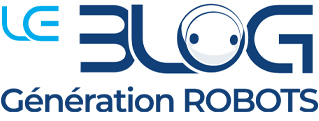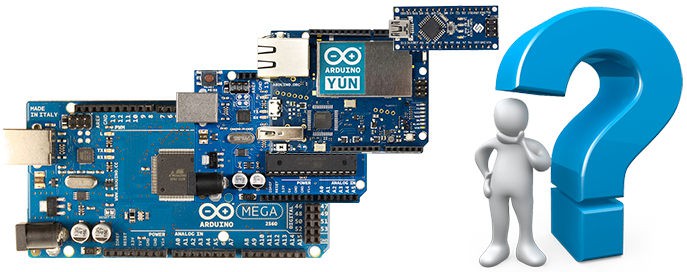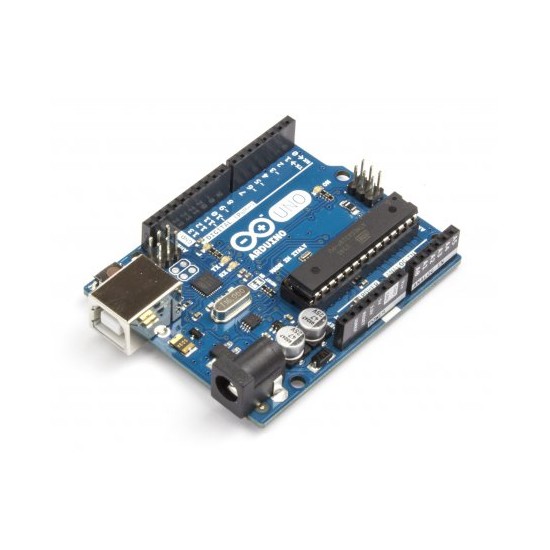The Arduino board serves as a basis for microcontroller programming – it’s a “mini-computer” in the form of an integrated circuit. The board comes in a multitude of versions, so it’s not always easy choosing the best one for your project.
Which is why we’ve created this short guide to help you choose the right Arduino board for you. Let’s get started!
Arduino Uno Rev 3 (aka the Super Star!) – BEGINNER
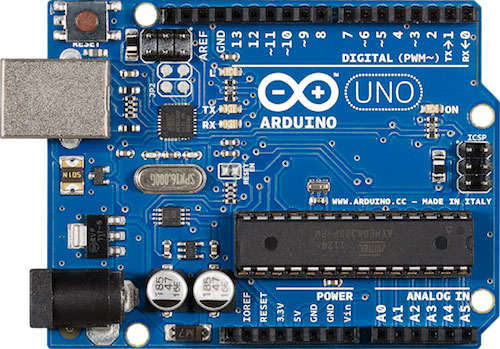
Arduino Uno Rev3 board: the most well-known and most used Arduino!
There are lots (and lots) of resources and a multitude of tutorials and project examples available on line. And this fact alone makes it the ideal board for beginners.
One small word of warning, however, because it only has a limited number of ports (6 analogue and 14 digital I/O including 6 PWM), which means it’s better suited to small projects.
There are several versions of this board, including:
- The Arduino SMD (with surface-mounted components)
- The Arduino Ethernet, an Arduino Uno board with an Ethernet port for communication with a wired network. It has an Ethernet + PoE extension, so it can also be powered over the Ethernet connection.
This board is for you if you’re launching into projects involving autonomous or connected mobile robots, or if you’re planning to embark on a home automation project in a single room.
Arduino Mega (the Challenger !) – EXPERIENCED/EXPERT
The Arduino Mega is the best-selling board after the Arduino Uno. It functions just the same, the only difference being the number of available ports (16 analogue and 54 digital including 14 PWM, compared with 6 analogue and 14 digital I/O including 6 PWM ). It’s ideal for complex assemblies requiring numerous sensors and actuators.
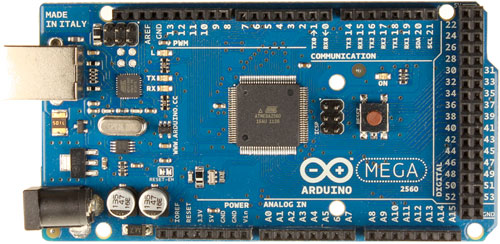
Arduino Mega board: ideal for complex assemblies requiring numerous sensors and actuators!
Here too, the board comes in several versions, including:
- The Arduino Mega classic
- The Arduino Mega ADK (Android development kit), which shares the same features as the basic Arduino Mega board but also has a USB port (which makes all the difference!). When connected to your Android smartphone, for example, your board can use the sensors in your phone.
This board opens the door to a multitude of new possibilities, but it’s not recommended for beginners because interacting with a smartphone requires fairly solid knowledge of Java programming. Enough to develop your own applications!
Arduino Due (artificial intelligence and algorithms) – EXPERT
Possessing the same number of ports as the Arduino Mega, only much more powerful, you can use this board in projects aimed at creating an artificial intelligence for mobile robots. If you need to handle complicated algorithms, or to make your robots more responsive, the Arduino Due is the one for you!
Please note, this version functions at 3.3V (instead of 5V).
As previously, we don’t recommend this board if you’re new to programming.
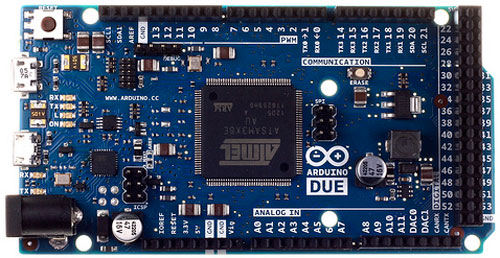
Arduino Due board : Artificial Intelligence and heavy algorithms..
Arduino nano (a safe choice for mini projects) – EXPERIENCED/EXPERT
A minimalist, augmented version of the Arduino Uno, this board has more ports than its counterpart (8 analogue and 14 digital including 6 PWM, compared with 6 analogue and 14 digital I/O including 6 PWM) despite its small size.
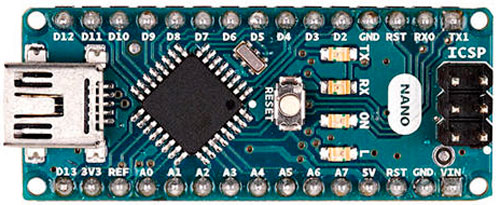
Arduino Nano: a safe choice for mini projects..
A minimalist, augmented version of the Arduino Uno, this board has more ports than its counterpart (8 analogue and 14 digital including 6 PWM, compared with 6 analogue and 14 digital I/O including 6 PWM) despite its small size.
It’s very good for projects involving miniaturisation, for example in a quadcopter, light gun or smart clothing. But be warned, you’ll need to do a little welding on the various pins.
Arduino Yun (if you can choose only one…) – EXPERIENCED
As far as we’re concerned, this is the most interesting of all the boards! It has the same processor as the Arduino Leonardo (Atmel ATmega32u4) but with one major difference: a module that generates a WiFi network!
You can connect it to a computer or smartphone to retrieve information from the board or to control it via a web browser. In addition to a WiFi module, the board comes with an on-board Linux, allowing you to access all the controls via Linux to use it as a WiFi/Ethernet interface.
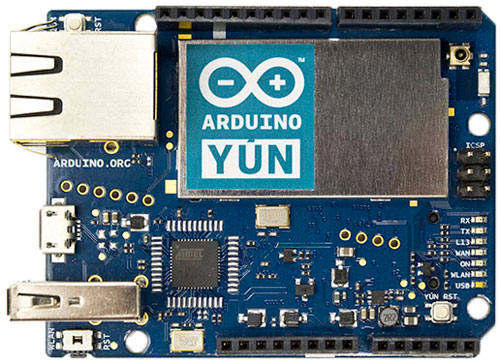
Arduino Yun board : WiFi and on-board Linux.. our favourite!
This board – more complex than the others – will allow you to work on some really very interesting projects, for example a mobile robot you can control from a web browser.
We can’t recommend this board for taking first steps in microcontroller programming, but it will prove very effective in projects involving remote control.
Arduino and IoT (Internet of Things) – BEGINNER/EXPERIENCED/EXPERT
The latest Arduino boards have been designed with IoT in mind. They have been built to address IoT specific issues such as being power-efficient, being connected to different networks (BLE, Ethernet, WiFi), or sporting many I/O pins and ports.
| Arduino MKR WiFi 1010 | Arduino Industrial 101 Evaluation Board | Arduino IoT MKR1000 WIFI Bundle |
| SAMD21 Cortex-M0+ 32 bits Low Power ARM microcontroller | ATmega32u4 microcontroller | SAMD21 Cortex M0+ 32bits 48 MHz microcontroller |
| Flash memory: 256 kB | Flash memory: 32 kB | Flash memory: 256 kB |
| SRAM memory: 32 kB | SRAM memory: 2.5 kB | SRAM memory: 32 kB |
| WiFi module: ESP32 compatible 2.4 GHz et 802.11 b/g/n | WiFi module: 802.11 b/g/n 2.4 GHz | WiFi module: 2.4 GHz 802.11 b/g/n |
| Ethernet : 802.3 10/100 Mbit/s | N/A | |
| 8 digital I/O pins | 20 digital I/O pins | 8 I/O pins |
| 12 PWM pins | 7 PWM pins | 12 PWM pins |
| 8 analog I/O pins | 3 GPIO | |
| Atheros AR9331 CPU | Flash memory: 16 MB | RAM: 64 MB DDR2 | The bundle MKR1000 is a pack that include an Arduino, motors, LEDS, sensors, etc. | |
| Operating voltage: 5V | Operating voltage: 5V | Operating voltage: 3.3V |
